六年级英语语法总复习(课堂用练习题答案) 2
小学六年级英语语法专练(含答案)
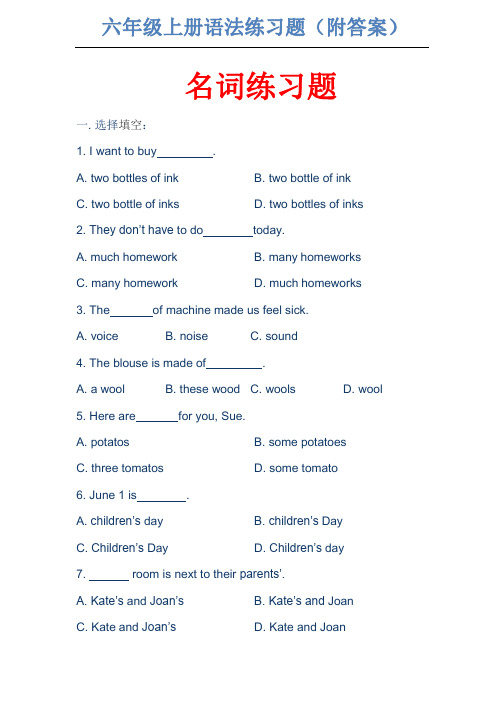
六年级上册语法练习题(附答案)名词练习题一. 选择填空:1. I want to buy .A. two bottles of inkB. two bottle of inkC. two bottle of inksD. two bottles of inks2. They don’t have to do today.A. much homeworkB. many homeworksC. many homeworkD. much homeworks3. The of machine made us feel sick.A. voiceB. noiseC. sound4. The blouse is made of .A. a woolB. these woodC. woolsD. wool5. Here are for you, Sue.A. potatosB. some potatoesC. three tomatosD. some tomato6. June 1 is .A. children’s dayB. children’s DayC. Children’s DayD. Children’s day7. room is next to their parents’.A. Kate’s and Joan’sB. Kate’s and JoanC. Kate and Joan’sD. Kate and Joan8. Miss Green is a friend of .A. Mary’s mother’sB. Mary’s motherC. Mary mother’sD. mother’s of Mary9. Tom is . He will come to see me.A. my a friendB. a friendC. mine friendD. a friend of mine10. Sheep white and milk also white.A. is, areB. are, isC. is, isD. are, are11. I’d like to have a glass of milk and .A. two breadsB. two pieces of breadsC. two pieces of breadD. two piece of bread12. It’s a long to Paris. It’s two thousand kilometers.A. streetB. roadC. wayD. end13. Many are singing over there.A. womanB. womenC. girlD. child14. He bought .A. two pairs of shoesB. two pair of shoesC. two pairs of shoeD. two pair of shoe15. Mr. White has three .A. childB. childrenC. childsD. childrens16. Beijing is one of the biggest in the world.A. citysB. cityC. cityesD. cities17. --- Where’s Mr. White? --- He’s in .A. the room 202B. Room 202C. the Room 202D. room 20218. --- Whose room is this? --- It’s.A. Li MingB. Li Ming’sC. Li Mings19. Every morning Mr. Smith takes a to his office.A. 20 minutes’ walksB. 20 minute’s walkC. 20-minutes walkD. 20-minute walk20. ---Are these ? --- No, they aren’t.A. sheepB. sheeps冠词( )1. This is interesting book and I enjoy it.A. aB.anC.the( )2. Middle school students don't need to go to school on weekends. They can go to park for fun with their parents or friends.A. /; aB. a; aC. the; aD. a; / ( )3. Nick is 8¬year¬old boy, but he can write more than 2,000 words.A. /B. theC. aD. an( )4. Bill likes playing basketball, but he doesn't like playing piano.A. the; theB./; theC. the; /( )5. Don't you know girl under the tree? She's our teacher's daughter.A. aB.anC. the( )6. new bridge has been built overChangjiang River in Huangshi.A. The; aB.A; theC.A; /D. An; the ( )7.—Do you know inventor?—Yes, he's friend of mine.A.an; theB. a; aC. the; a( )8. Lisa had egg and glass of milk for breakfast this morning.A. a; aB.an; anC. a; anD.an; a( )9. This summer, I'm going to visit Great Wall.A. aB.anC. theD./( )10.—Is Mr. Franco honest and capable man?—Yes.A.aB.anC.the( )11. In order to find better job, she planned to learn a second foreign language.A.theB.aC.an( )12. My mother is English teacher in a university in Beijing.A.aB.anC.theD./( )13.—What do you usually have for breakfast, Peter?—A fried egg, three pieces of bread and a glass of milk.A.aB.anC.theD./( )14. It's not good idea to drive for four hours.A.aB.anC.the( )15.—What does Michael look like?—He has big eyes and wide mouth.A.aB.anC.the( )16.—What do you want to be in the future, Nick?—I want to be pilot.It is exciting job.A.a; aB.a; anC.the; anD.a; the( )17. As we know, England is European country and Singapore is Asian country.A.an; anB.an; aC.a; aD.a; an( )18. Look!There is cat in the tree.A.aB.anC.theD./( )19.——“Cindy, do you have e-mail address?I want to send you some photos.”-“Yes, I do. It's *****************.”A.aB.anC.the( )20. Students usually go to school on weekdays.A. /B.theC.a代词( )1.Mr.Wang is very friendly, and like him very much.A.weC.ourD.ours ( )2.—Excuse me, are these books ?—No, they are classmate's.A.his; heB.hers; hersC.your; mineD.yours; my ( )3.—Is Miss White English teacher, Maria?—No, she teaches geography.A.your; myB.you; mineC.you; usD.your; us ( )4. Are there any differences between your idea and?A.heB.hisC.sheD.her ( )lie gave a baby cat yesterday that hurtwhen it fell from a tree.A.me; itB.myself; itselfC.me; itselfD.myself; it ( )6.—Who is the best friend of at school?—I think Helen is.We often help each other.A.mineB.hisC.yoursD.hers ( )7.—Linda, help to some fruit.—Thank you.A.youB.yoursC.yourselfD.yourselves( )8.—The pet dog in your hand is very nice.Is it _ ?—Yes, but I'll give it to my friend, Lucy, as birthday present.A.you; herB.yours; herC.your; herD.you; hers ( )9.—How was your visit to the World Park in Beijing?—Wonderful! We enjoyed very much.A.itselfB.myselfC.yourselvesD.ourselves ( )10.—Excuse me, I want to have my watch fixed, but I can't finda repair shop.—I know e on, I'll show you.A.oneB.itC.someD.that( )11.My sister has two skirts.One is yellow, is black.A.otherB.anotherC.othersD.the other ( )12.Sam looks like his Dad.They are tall.A.eitherB.anyC.allD.both( )13.—Do you want tea or coffee?—.I really don't mind.A.NoneB.EitherC.NeitherD.All( )14.—Wow!You've got so many skirts.—But of them are in fashion now.A.allB.bothC.neitherD.none( )15.—What do you think of the two backpacks?—of them are very nice.A.EitherB.BothC.EachD.All( )16.I hope I can find for my son in the shop.A.good somethingB.something goodC.many thingD.good anything( )17.All of us find necessary to take exercise every day.A.thisB.thatC.itD.them ( )18.Things made by hand are usually more expensive than produced in factories.A.theseB.thisC.thatD.those ( )19. There is wrong with my computer. It doesn' t work now. I’ll buy a new one.A. nothing.B. something.C. everything.( )20.—Do you have anything important to say for yourself?—except sorry.A.SomethingB.NothingC.AnythingD.Everything介词( )1. Lady Gaga is famous her beautiful voice.A.asB.withC.for( )2.—Jenny, will you still be here this afternoon?—Yeah, I think I'll stay five. Then I'm leaving for dinner.A.atB.inC.until( )3. I think every student should go to school , but some of them are always late.A.by the timeB.on timeC.for a timeD.at times ( )4. Linda is not good at Chinese, but she passed the exam the help of her classmates.A.withB.underC.without( )5. World No Smoking Day is May 31.A.inB.onC.at( )6. The paper is made wood and the desk is also made wood.A.of; fromB.of; ofC.from; of( )7. Don't drive so fast! We must slow down when we drive the tunnel.A.pastB.acrossC.overD.through( )8. The two kids practice English joining the English club.A.byB.inC.onD.with( )9. Lucy and I are twins, but we're different eachother in many ways.A.forB.inC.ofD.from( )10. On the way the mountain village, we found the local houses different from ours.A.toB.byC.atD.on( )11.—Jack, is maths difficult to learn in high school?—Sure. No subject can be learned well hard work.A.withoutB.throughC.byD.with( )12. In some western countries shops are closedweekends.A.inB.toC.atD.with( )13.Look at the wall.There are some pictures it.A.inB.onC.toD.at( )14.We can see a playground the two tall buildings.A.betweenB.amongC.inD.to( )15.—What time do you usually get up in the morning?—six o'clock.A .On B.For C.In D.At( )16. Linda was born July 2, and my birthday is also that month.A.in; onB.in; atC.on; inD.on; at ( )17. Both my parents were born 1970.A.atB.inC.onD.to( )18.—When will the second class begin?—two minutes.A.ForB.AtC.InD.After( )19.—Is Jack good at basketball?—Yes. basketball he is also good at table tennis.A.E xceptB.BesidesC.ButD.Beside ( )20. I go to school bus every morning.A.inB.onC.atD.by形容词和副词( )1.—Which is , the sun, the moon or the earth?—Of course the moon is.A.smallB.smallerC.smallestD.the smallest ( )2.He has made progress this term than before.A.littleB.lessC.fewerD.much ( )3.“We must keep in the library.”The woman saidto me.A.quiet; quietlyB.quietly; quietlyC.quietly; quietD.quiet; quiet ( )4.I can't get anything on TV. There must be with it.A.wrong somethingB.wrong nothingC.something wrongD.nothing wrong( )5.Linda has received that she is unable to get a job.A.such little educationB.so little educationC.a such little educationD.a so little education( )6.Many students think foreign languages are science subjects.A.more difficult asB.less difficult thanC.much difficult thanD.so difficult as( )7. the temperature is, water turns into steam.A.The high; the fastB.Higher; fasterC.The more higher; the fasterD.The higher; the faster( )8.He eats food, so he is fat.A.much too; too muchB.much too; too manyC.too much; much tooD.too much; many too( )9.—Who is Ren Changxia?—A great policewoman.She always thought of othersthan herself.A.moreB.muchC.lessD.most( )10.Kate felt when she saw the lovely dress in theclothes shop.A.pleasedB.tiredC.wellD.good( )11.Do not use so much water.It's .A.healthyefulC.wastefulD.rude( )12.Knowledge is money.But I think it is money.A.as important asB.so important asC.more important thanD.the same as( )13.—I think our chemistry teacher is working hard. He teaches us .—Yes, but he hasn't come today.He doesn't feel .A.good; wellB.good; goodC.well; goodD.well; well( )14. I read, I'll be.A.The much; the happyB.More; happierC.The more; the happierD.The most; the happiest( )15.I found he looked than last time when I went to see him.A.betterB.wellC.goodD.worrying( )16.The mother looked because her son hadn't been back.A.worryB.worriedC.to worryD.worrying ( )17.This sweater doesn't suit me.It's a bit small.Could you giveme one?A.a largeB.a largerC.the largestD.a smaller ( )18.—You have got the same shirt as I.—Yes.Mine is , but not so as yours.A.better; expensiveB.better; more expensiveC.more better; expensiveD.good; more expensive( )19.—Do you think the fish tastes ?—She cooked it , I think.A.good; goodB.well; goodC.well; wellD.good; well ( )20.—What's the matter with you?—I'm .I want some water to drink.A.thirstyB.hungryC.tiredD.sleep数词( )1. The volunteers sent books to a mountain village school on Children's Day.A.two hundreds ofB.two hundred ofC.two hundredsD.two hundred( )2.It is reported that people throw plastic bags along this street every day.A.hundredB.hundredsC.hundred ofD.hundreds of ( )3. What a surprise! It's time I've met the beautiful girl this week.A.threeB.thirdC.the threeD.the third ( )4. The teacher said that of the boys would take partin the talent show.A.three fiveB.three fivesC.thirds fifthsD.three fifths ( )5. About of the students in Grade N ine this year were born in the .A.three five; 1996B.three fifths; 1990sC.third fifth; 1997D.third fifths; 1990s( )6. of his works were written in his .A.One third; fiftiesB.One third; fiftyC.One thirds; fifties( )7. Our school is so famous that people come andvisit it every term.A.hundredB.hundredsC.hundred ofD.hundreds of ( )8. The action film has attracted millions of youngpeople to the cinema.A.130-minuteB.130-minutesC.130 minuteD.130 minutes ( )9. There are over students in their school.A.hundredsB.nine hundredsC.nine hundred( )10.—Jackie Chan has donated dollars to charity.—He is an example to us all.A.thousandB.thousandsC.thousand ofD.thousands of ( )11. Now, everybody, please turn to Page and look atthe picture.A.F ifth; fiveB.Five; fifthC.Fifth; fifthD.Five; five ( )12. My uncle bought me an iPhone for my birthday.A.twelveB.twelfthC.the twelveD.the twelfth ( )13. For breakfast, I usually have and two pieces of bread.A.a cup of milk halfB.half a cup of milkC.a half milk cupD.half a milk cup( )14.—How old is your daughter?—.We had a special party for her birthday last Sunday.A.Nine; nineB.Nine; ninthC.Ninth; nineD.Ninth; ninth( )15. Tom has just finished writing a article.A.nine-hundred-wordsB.nine-hundreds-wordC.nine-hundred-wordD.nine-hundreds-words( )16. I don't believe that this boy can paint such a nice picture.A.five years oldB.five-years-oldC.five-year-old( )17.—Excuse me, how can I get to the museum?—Sorry.It's my time to be here.A.oneB.firstC.once( )18.—Excuse me, where can I buy a jacket?—You can go to the Men's Wear Section on the floor.A.twoB.twiceC.second非谓语动词( )1. The group found it hard the job in time.A.finishingB.finishedC.to finishD.finish( )2.Why don't you let me now?A.to goB.goC.goingD.gone( )3.It's raining heavily.You'd better now.A.don't goB.don't to goC.not leaveD.not to leave ( )4.I'm allowed on Saturday.A.go to the moviesB.going to the moviesC.went to the moviesD.to go to the movies( )5.We mix the water and flour bread.A.to makeB.makingC.makeD.makes ( )6.Linda would rather than stay here.A.leftB.to leaveC.leavingD.leave ( )7.Did you watch the actor the whole play yesterday?A.performingB.to performC.performD.performed ( )8.They would really like you them.A.joinB.should joinC.to joinD.will join ( )9.There are so many kinds of MP4 in the shop.I can't decide .A.what to buyB.to buy whatC.which to buyD.to buy which ( )10.We decided our holiday in that town.A.not to spendB.not spendC.not spendingD.don't spend( )11.Lily hopes in France.A.studyB.studiesC.studyingD.to study ( )12.Some people find it easy the truth.A.to knowB.to knowingC.knowingD.know ( )13.We want the tour as soon as poss ible.A.startingB.startedC.startsD.to start ( )14.My mom had me _ a bottle of oil for her.A.to buyB.buyC.buyingD.buys ( )15.The teacher often encourages us hard.A.studyingB.studyC.studiesD.to study ( )16.The baby was made by this naughty brother.A.cryingB.cryC.to cryD. cries ( )17.It took Janet three hours reading this interesting story.A.to finishB.finishedC.finishingD.finish ( )18.My family invite you next Friday for the party.eB.to comeingD.came ( )19.It's so hot! Let's stop .A.has a glass of waterB.having a restC.to have a glass of waterD.have a rest情态动词1. Y ou stop when the traffic light turns red.A. canB. had betterC. needD. must2. — Mum, must I stay there the whole day?—No, you . You come back afterlunch, if you like.A. mustn't; canB. needn't; mustC. needn't; may3. “Whose notebook is this?”“It Jim’s. It has his name on it.”A. can’t beB. must beC. can be4. There's enough time for you to go to the airport. You hurry now.A. shouldB. needn'tC. mustD. can't5. —Mum, must I wash the dishes right now?—No, you .A. shouldn’tB. wouldn’tC. mustn’tD. needn’t6. —Is that your teacher?—That be Mr.Wang. He has gone to Japan with his wife.A. can’tB. mustn’tC. may not7.—Must I do my homework now, Mum?—. You can do it tomorrow.A. No, you needn’tB. No, you mustn’tC. Yes, you needD. Yes, you must8. ——You can hardly swim,you?——.But my mother says she’ll teach me during my summer holiday.A.can’t;No B.can;No C.can’t;Yes D.can;Yes9. —Is that your teacher?—That be Mr.Wang. He has gone to Japan with his wife.A. can’tB. mustn’tC. may not10. —Is that girl under the tree Mary?—No, that be Mary. She has gone to New York.A. canB. mustn’tC. can’t11.—Is Maria knocking at the door?—It be her. She has gone to Australia.A.may notB.needn'tC.mustn'tD.can't12. — Must I take a taxi?— No, you . It’s not far from here.A. can’tB. mustn’tC. shouldn’tD. needn’t13. -You be happy with the strong public support you‘ve received.-Yes,you’re right.I‘m really excited.A.mayB.canC.mustD.need14. Tom, you play with the knife.You hurt yourself.A. won't; can'tB. mustn't; mayC. should; mustD. can't; should15. I am not sure,he be in the classroom.A.may B.must C.can答案名词1-5 AABDB 6-10 CCADB 11-15 CCBAB 16-20 DBBDA 冠词1-5BADBC6-10BCDCB11-15BBDAA16-20BDABA 代词1-5ADDB C6-10CCBDA11-15DDBDB16-20BCD BB 介词6-10CDADA11-15AC BAC16-20CBCB D 1-5CCBAB形容词副词1-5DBACB6-10B DCAA11-15CCDCA16-20BBADA 数词1-5DDDD B6-10ADA CD11-15BBBBC16-18CBC非谓语动词1-5CBCDA6-10DCCCA11-15DA D BD16-20CABCD 情态动词1-5DC BBD6-10AA B A C11-15DDC B A。
六年级下册英语试题-语法专题复习练习题二(含答案PDF)人教PEP
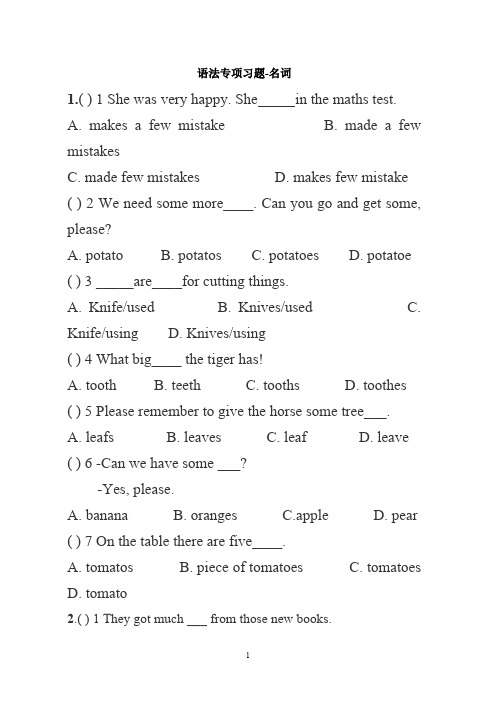
语法专项习题-名词1.( ) 1 She was very happy. She in the maths test.A. makes a few mistakeB. made a few mistakesC. made few mistakesD. makes few mistake ( ) 2 We need some more____. Can you go and get some, please?A. potatoB. potatosC. potatoesD. potatoe ( ) 3 _____are____for cutting things.A. Knife/usedB. Knives/usedC. Knife/usingD. Knives/using( ) 4 What big____ the tiger has!A. toothB. teethC. toothsD. toothes ( ) 5 Please remember to give the horse some tree___.A. leafsB. leavesC. leafD. leave ( ) 6 -Can we have some ___?-Yes, please.A. bananaB. orangesC.appleD. pear ( ) 7 On the table there are five____.A. tomatosB. piece of tomatoesC. tomatoesD. tomato2.( ) 1 They got much ___ from those new books.A. ideasB. photosC. informationD. stories ( ) 2 He gave us____ on how to keep fit.A. some advicesB. some adviceC. an adviceD.a advice( ) 3 When we saw his face, we knew___ was bad.A. some newsB. a newsC. the newsD. news ( ) 4 What___ lovely weather it is!A. /B. theC. anD. a3( ) 1 -Would you like___tea?-No, thanks. I have drunk two____.A. any, bottles of orangeB. some, bottles of orangeC. many, bottles of orangesD. few, bottle of oranges ( ) 2 He is hungry. Give him ___ to eat.A. two breadsB. two piece of breadC. two pieces of breadD. two pieces of breads( ) 3 It really took him:___ to draw the nice horse.A. sometimesB. hourC. long timeD. some time ( ) 4 I would like to have___.A. two glasses of milkB. two glass of milk IC. two glasses of milksD. two glass of milks( ) 5 Can you give me ____?A. a teaB. some cup of teaC. a cup teaD. acup of tea( ) 6 Please give me ___ paper.A. oneB. a pieceC. aD. a piece of( ) 7 John bought___for himself yesterday.A. two pairs of shoesB. two pair of shoeC. two pair of shoesD. two pairs shoes4( ) 1 -How many ____ have you got on your farm?-I've got five.A. sheepsB. sheepC. pigD. chicken ( ) 2 Some ___ came to our school for a visit that day.A. GermansB. GermenC. GermanyD. Germanies( ) 3 In the picture there are many____ and two_____.A. sheep; foxes C. sheeps; foxesB. sheeps; fox D. sheep;foxs( ) 4 A group of______ will visit the museum tomorrow.A. HungarianB. AustralianC. JapaneseD. American5( ) 1 This table is made of___.A. many glassB. glassesC. some glassesD. glass ( ) 2 -What would you like to have for lunch, sir? -I'd like____.A. chickenB. a chickenC. chickensD. the chicken ( ) 3 Children should make____ for old people in a bus.A. roomB. a roomC. roomsD. the room6( ) 1 Tables are made of___.A. woodB. some woodsC. woodenD. woods ( ) 2. I wonder why ______ are so interested in action (武打片) films.A. peopleB. peoplesC. the peopleD. the peoples( ) 3. I have read____ of the young writer.A. worksB. workC. this worksD. the works7. ( ) 1. Let's meet at 7: 30 outside the gate of___?A. the People's ParkB. the Peoples' ParkC. the People ParkD. People's Park( ) 2. ___ Chinese people are ___ hard working people.A. /; aB. We; theC. The; theD. The; a( ) 3 How many were there in the street when the accident happened?A. policemanB. policesC. policeD. peoples 8( ) 1 If these trousers are too big, buy a smaller____.A. setB. oneC. pieceD. pair( ) 2 Last week I bought a TV____.A. pairB. setC. pieceD. block( ) 3 There is a_____ of wood left on the ground.A. cupB. pieceC. boxD. pair9( ) There are sixty-seven___ in our school.A. women's teacherB. women teachersC. woman teachersD. women teacher10( ) 1 They write most of their___ in English.A. business letterB. business lettersC. businessesD. businesses letters( ) 2 We came to a ___ at last and went in.A. watch shopB. watches shopC. watching shopD. watchs shop( ) 3 This shop sells apples, bananas and things like these. It's a___.A. food shopB. book shopC. fruit shopD. vegetable shop( ) 4 She broke a___while she was washing up.A. glass of wineB. glass for wineC. glass wineD. wine glass( ) 5 I've forgotten both of the____.A. room numbersB. rooms numberC. rooms numbersD. room number11.1. September 10th is____in China.A. Teacher's DayB. Teachers'DayC. Teacher DayD. Teachers Day( ) 2 -Is the broom under ____ desk? -No, it's under____.A. the teacher's; myB. teacher's; mineC. teacher's; meD. the teacher's; mine( ) 3 Excuse me, where is the___?A. men's roomB. mens' roomC. men's roomsD. men rooms12.( ) 1 The football under the bed is____.A. Lily and LucyB. Lily's and Lucy'sC. Lily's and LucyD. Lily and Lucy's( ) 2 This is my____dictionary.A. sister MaryB. sister'sC. sister, Mary'sD. sister's Mary's( ) 3 He went to ___ shop to buy a shirt.A. a tailorB. the tailorC. a tailorsD. the tailors' ( ) 4 Joan is____.A. Mary's and Jack sisterB. Mary and Jack's sisterC. Mary and Jack sisterD. Mary's and Jack's sister13.( ) 1 In a few____ time, those mountains will be covered with trees.A. yearB. years'C. year'sD. years( ) 2 It's about ___ walk from my house.A. ten minuteB. ten minutes'C. ten minute'sD. ten minutes( ) 3 The post office is a bit far from here. It's about_____.A. thirty minutes's walkB. thirty minute's walkC. thirty minutes' walkD. thirty minutes walk( ) 4 Half___ telephone calls are made in English.A. the worldB. worldC. the world'sD. world's14.( ) 1 ____ face to the south.A. Windows of the roomB. The windows of the roomC. The room's windowsD. The windows in room ( ) 2 Please take two___.A. picture of the parkB. pictures of the parkC. the pictures of a parkD. picture of a park( ) 3 The workers are repairing____.A. the roof of the houseB. a roof of the houseC. roof of the houseD. this roof of house15.( ) 1 Miss Smith is a friend of____.A. Mary's mother'sB. Mary's motherC. mother's of MaryD. Mary mothers( ) 2 This is a book of ___.A. TomB. Tom'sC. herD. him( ) 3 The post card is sent by ____.A. a friend of my fatherB. a friend of my father'sC. my father friendD. my father friend's16.( ) 1 Sydney is a city of___.A. AmericaB. GermanyC. AustraliaD. Japan ( ) 2 My father likes buying us ___.A. carsB. flowersC. peasantsD. presents( ) 3 In England, the last name is the ___.A. full nameB. family nameC. middle nameD. given name( ) 4 Mr Gao is a teacher. He works in a new____.A. shopB. schoolC. factoryD. hospital17.( ) 1 My father is a____. He works in a hospital.A. teacherB. doctorC. farmerD. soldier( ) 2 -Which animal lives only in China?-The____.A. tigerB. monkeyC. pandaD. elephant ( ) 3 April comes before___and after___.A. March; MayB. May; MarchC. June; MayD. March; February( ) 4 Which of the following is right?A. China has a large population.B. China has much population.C. China has many populations.D. China has a great deal of population.( ) 5 Please do like this. Fold the paper____ and cut along the fold.A. into piecesB. in halfC. on halvesD. to half ( ) 6 You played the violin wonderfully. Will you please play another____?A. oneB. gameC. programmeD. piece参考答案:1. 1-7 C C B B B B C2. 1-4 C B C A3. 1-7 B C D A D D A4. 1-4 B A A C5. 1-3 D A A6. 1-3 A A D7. 1-3 A D C8. 1-3 D B B9. 1-3 B D B10. 1-5 B A C D A11. 1-3 B D A12. 1-4 D C C B13. 1-4 B B C C14. 1-3 B B A15. 1-3 A B B16. 1-4 C D B B17. 1-6 B C B A B D。
初中英语六年级全册语法练习集合

初中英语六年级全册语法练习集合本文档为初中英语六年级全册语法练集合,旨在帮助学生提升语法能力。
以下是一些常见的语法练题示例:1. 选择题1.1. 形容词和副词1. He is a ____(good) student.A. goodB. wellC. niceD. fine2. She speaks English ____(fluently).A. fluentlyB. goodC. goodlyD. quickly1.2. 时态和语态3. The party ____(start) at 8 p.m. tonight.A. startingB. startsC. will startD. started4. English ____(speak) in many countries.A. speakB. is spokenC. speakingD. spoke2. 填空题2.1. 连词5. I like both apples ____(and) oranges.6. She is not only a talented singer, ____(but) also a skilled dancer.2.2. 名词单复数和形式变化7. Do you have any ____(child)? No, I don't have any ____(child).8. The ____(woman) are waiting for the bus.3. 句子改错9. He gos to school by bus every day. (改为正确形式)10. Are there any book on the desk? (改为复数形式)请根据需要自行增加练题,并配以相应的答案。
愿本文档能帮助学生们在英语语法学习中取得更好的成绩!。
【复习讲解篇】通用版小学英语语法总复习讲练-句型(含答案)

◈通用版小学英语语法总复习- 句型(讲解&检测)➱讲解篇一、陈述句●陈述一个事实或说话人的看法;●分为肯定句和否定句●句末结尾为“.”(英语的句号为一个实心点)(一)肯定句(小学阶段为简单句)1.主语+be动词(am/is/are)+表语I am happy.我很开心。
He is young.他还年轻。
They are kind.他们很和蔼。
2.主语+谓语(不及物动词)The match begins.比赛开始了。
The students smiled.学生们笑了。
The car goes fast.【可以用状语(副词)修饰】汽车跑得很快。
3.主语+谓语(及物动词)+宾语+(状语)He wrote letters just now.他刚刚在写信。
I eat an apple everyday morning.我每天都吃一个苹果。
4.主语+谓语+间接宾语+直接宾语She passed me a plate.她递了一个盘子给我。
Amy give him a hug.艾米给了他一个拥抱。
5.主语+谓语+宾语+宾语补足语She speak English well.她英语讲得很好。
I make her cry.我把她弄哭了。
(二)否定句1.be动词+notI am a student. → I am not a student.我不是一名学生。
They are in the house. → They aren’t in the house.他们不在房子里面。
2.情态动词+not+动词原形You can do it. → You can’t do it.你不可能做到。
She must stay here. → She must not stay here.她不许留下。
3.助动词+not+动词原形I don’t like this.我不喜欢这个。
He doesn’t forget to bring his book.他没有忘记带他的书。
小学教育英语语法专项学习学习复习计划练学习的试题含答案
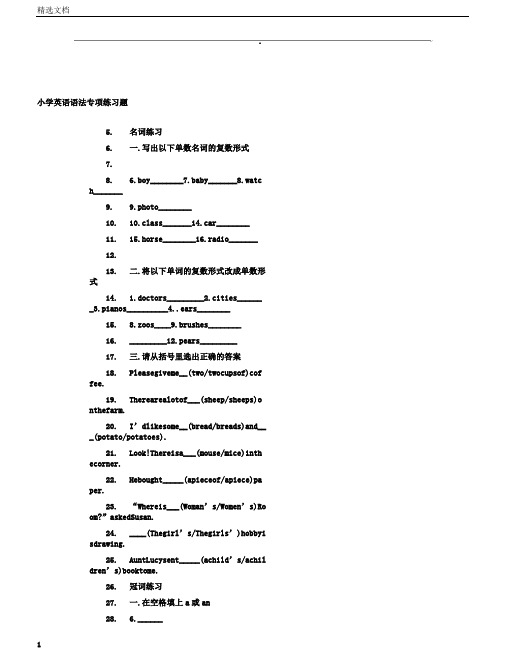
.小学英语语法专项练习题5.名词练习6.一.写出以下单数名词的复数形式7.8. 6.boy________7.baby_______8.watch_______9.9.photo________10.10.class_______14.car________11.15.horse________16.radio_______12.13.二.将以下单词的复数形式改成单数形式14. 1.doctors_________2.cities_______3.pianos__________4..ears________15.8.zoos____9.brushes________16._________12.pears_________17.三.请从括号里选出正确的答案18.Pleasegiveme__(two/twocupsof)coffee.19.Therearealotof___(sheep/sheeps)onthefarm.20.I’dlikesome__(bread/breads)and___(potato/potatoes).21.Look!Thereisa___(mouse/mice)inthecorner.22.Hebought_____(apieceof/apiece)paper.23.“Whereis___(Woman’s/Women’s)Room?”askedSusan.24.____(Thegirl’s/Thegirls’)hobbyisdrawing.25.AuntLucysent_____(achild’s/achildren’s)booktome.26.冠词练习27.一.在空格填上a或an28. 6.______129.elephant7.______hat8.______umbrella9.______rabbit10.______idea11.______hour30.12_______honestboy13.______interestingbook14.______easyquestion31.15.______orangedress32.16_______X-raymachine17______icecream33.二.选择填空34. 1.Momtellsherlittledaughter_____oldstoryeverynight.A.aB./C.anD.the35.______computeronthetableisSusan’s.A.AB.AnC.TheD./36. 3.Thereis______mapoftheworldon______wall.______mapismine.A.a,a,AB.37.a,the,TheC.the,the,TheD.the,the,A38.______Springcomesafter______winter.A./,/B.The,/C.The,theD.A,theWord文档2.1.6.Ibought______shoesyesterday.______shoesareverybeautiful.A.a,TheB.a2.pairof,TheC.the,TheD.apair,Thepair7.Hewas______soldierintheSecond3.WorldWar.4.A.aB.anC.theD./5.8.Shecanplay______and______.6.A.thetennis,theguitarB.tennis,guitar7.C.thetennis,guitarD.tennis,theguitar8.9.Icansee______moonand______cloudsinthesky.A.the,aB.a,aC.the,/D.9.the,the10.______Tian’anmenSquareisin__Beijing.A./,/B.A,/C.The,/D./,the11.12.12.—Canyoutellme______nearestbookshop?13.—Gostraightandturnrightat_______thirdcrossing,andyouwillseeit.A.the,a14.the,theC.a,theD.the,/15.三依据中文,写出以下固定搭配的英文。
陕旅版小学六年级英语总复习之语法完整版

陕旅版小学六年级英语总复习之语法HEN system office room 【HEN16H-HENS2AHENS8Q8-HENH1688】小学英语语法及习题一、名词复数规则1.一般情况下,直接加-s,如:book-books, bag-bags, cat-cats, bed-beds 2.以s. x. sh. ch结尾,加-es,如:bus-buses, box-boxes, brush-brushes, watch-watches3.以“辅音字母+y”结尾,变y为i,再加-es,如:family-families, strawberry-strawberries4.以“f或fe”结尾,变f或fe为v, 再加-es,如:knife-knives5.不规则名词复数:man-men, woman-women, policeman-policemen, policewoman-policewomen, mouse-micechild-childrenfoot-feet,.tooth-teethfish-fish, people-people, Chinese-Chinese, Japanese-Japanese写出下列各词的复数I _________him _________this___________her ______watch _______child _______photo________diary ______day________ foot________book_______ dress ________tooth_______ sheep ______box_______ strawberry _____thief _______yo-yo ______peach______ sandwich ______man______ woman_______ paper_______ juice___________water________ milk________rice__________ tea__________二、一般现在时一般现在时基本用法介绍【No. 1】一般现在时的功能1.表示事物或人物的特征、状态。
(完整)小学英语六年级总复习语法及练习题(一)
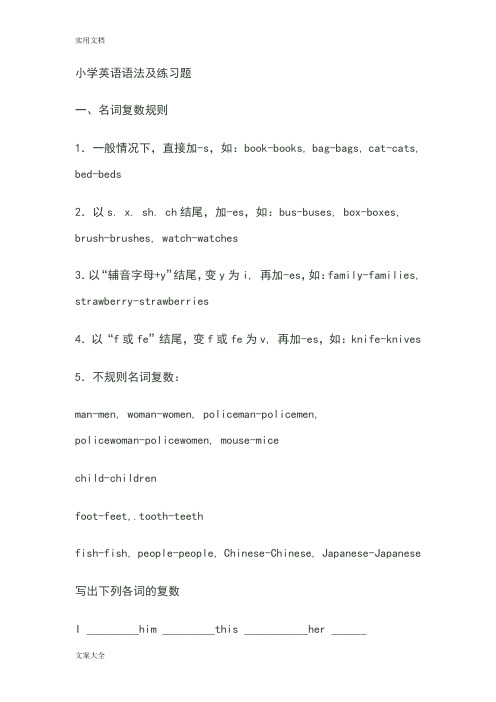
小学英语语法及练习题一、名词复数规则1.一般情况下,直接加-s,如:book-books, bag-bags, cat-cats, bed-beds2.以s. x. sh. ch结尾,加-es,如:bus-buses, box-boxes, brush-brushes, watch-watches3.以“辅音字母+y”结尾,变y为i, 再加-es,如:family-families, strawberry-strawberries4.以“f或fe”结尾,变f或fe为v, 再加-es,如:knife-knives 5.不规则名词复数:man-men, woman-women, policeman-policemen,policewoman-policewomen, mouse-micechild-childrenfoot-feet,.tooth-teethfish-fish, people-people, Chinese-Chinese, Japanese-Japanese 写出下列各词的复数I _________him _________this ___________her ______watch _______child _______photo ________diary ______day________ foot________ book_______ dress ________tooth_______ sheep ______box_______ strawberry _____thief _______yo-yo ______ peach______ sandwich ______man______ woman_______ paper_______ juice___________ water________ milk________ rice__________ tea__________ 二、一般现在时一般现在时基本用法介绍【No. 1】一般现在时的功能1.表示事物或人物的特征、状态。
译林版六年级下册英语语法填空课堂知识练习题

译林版六年级下册英语语法填空课堂知识练习题班级:__________ 姓名:__________1. 用所给单词的适当形式填空。
[1]In the classroom, we should be_____________(quietly).[2]Helen is_____________ . She dances _____________.(happy)[3]The mouse_____________(bite)the door yesterday.[4]—Would you like_____________(eat)some mushrooms? —Yes, please. [5]The lion_____________(get)out from the net at last.[6]You shouldn''t_____________(catch)the birds. They are our friends. [7]The dog and the cat_____________(become)good friends from then on. [8]The boy_____________ (say), 'I will go to the park.' Then he got on the bus. [9]The girl is_____________(dance)beautifully.2. 写出下列单词的现在分词。
swim comerun cryhave shinewrite singride fly3. 读句子,找出正确的一项写在横线上。
[1]I’m hungry. I’d like ________ (any / some) bread.[2]These balls ________ (is / are) five dollars.[3]This basketball is ________ (heavy / light). I can’t throw it.[4]Danny always ________ (think / thinks) he can hit the ball.[5]Yesterday they ________ (watched / watch) Bob play basketball.4. 根据图片提示完成下列句子。
pep六年级上英语期末专项复习试题-句型转换(含答案)
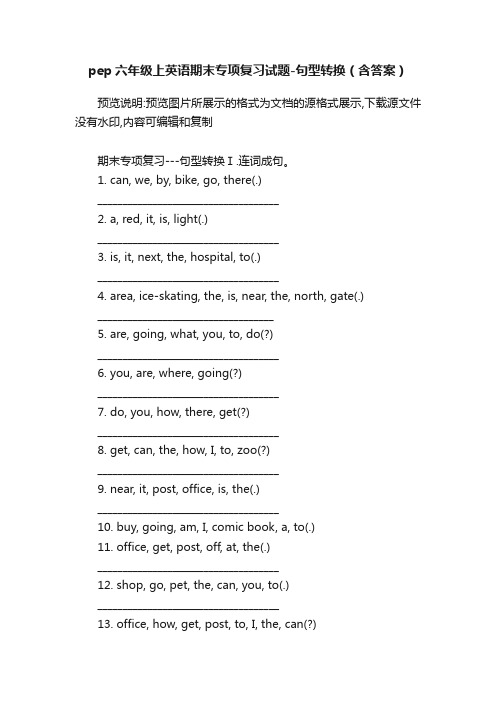
pep六年级上英语期末专项复习试题-句型转换(含答案)预览说明:预览图片所展示的格式为文档的源格式展示,下载源文件没有水印,内容可编辑和复制期末专项复习---句型转换Ⅰ.连词成句。
1. can, we, by, bike, go, there(.)____________________________________2. a, red, it, is, light(.)____________________________________3. is, it, next, the, hospital, to(.)____________________________________4. area, ice-skating, the, is, near, the, north, gate(.)___________________________________5. are, going, what, you, to, do(?)____________________________________6. you, are, where, going(?)____________________________________7. do, you, how, there, get(?)____________________________________8. get, can, the, how, I, to, zoo(?)____________________________________9. near, it, post, office, is, the(.)____________________________________10. buy, going, am, I, comic book, a, to(.)11. office, get, post, off, at, the(.)____________________________________12. shop, go, pet, the, can, you, to(.)____________________________________13. office, how, get, post, to, I, the, can(?)____________________________________14. is,where,museum,the,science(?)____________________________________15. to,hospital,is,next,it,the(.)____________________________________Ⅱ. 英汉互译。
部编版小学六年级英语总复习资料(含答案)
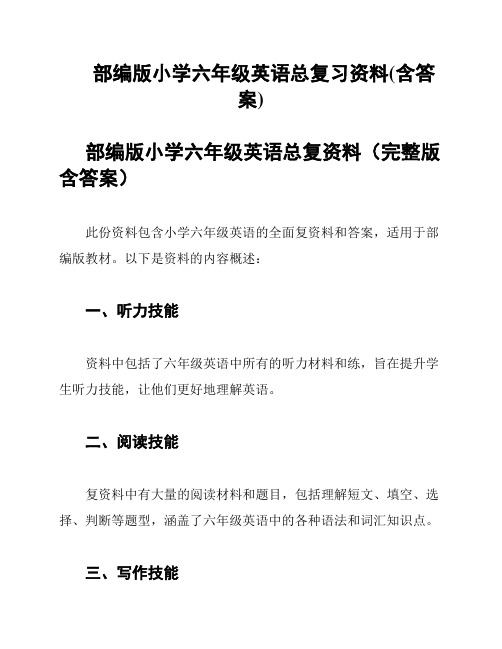
部编版小学六年级英语总复习资料(含答
案)
部编版小学六年级英语总复资料(完整版含答案)
此份资料包含小学六年级英语的全面复资料和答案,适用于部编版教材。
以下是资料的内容概述:
一、听力技能
资料中包括了六年级英语中所有的听力材料和练,旨在提升学生听力技能,让他们更好地理解英语。
二、阅读技能
复资料中有大量的阅读材料和题目,包括理解短文、填空、选择、判断等题型,涵盖了六年级英语中的各种语法和词汇知识点。
三、写作技能
资料中共有35个写作任务,每个任务包括了写作指导、范文和练题。
这些练旨在提高学生的写作能力,让他们能够独立地运用英语进行表达。
四、语言知识点
复资料中还包括了小学六年级英语的所有语法和词汇知识点,其中每个知识点都有详细的讲解和例句,并提供了丰富的练题,帮助学生巩固所学知识。
五、完整的答案
资料中提供了所有练题的答案,包括听力练和阅读练、写作和语言知识点的练,方便学生自行核对。
总的来说,此份资料是一份全面、详细的小学六年级英语复习资料,适用于需要全面回顾英语知识点的学生,也适用于备战期末考试的学生。
希望此资料能够帮助到大家。
六年级英语基础语法练习题及答案

六年级英语基础语法练习题及答案一、选择正确的单词完成下列句子。
1. I ________ basketball every Sunday.a. playb. playsc. playingd. played2. She ________ to school by bus.a. gob. goesc. goingd. went3. They ________ to the zoo last week.a. gob. goesc. goingd. went4. Susan ________ a book now.a. readb. readsc. readingd. readed5. We ________ swimming in the summer.a. gob. goesc. goingd. went答案:1. a 2. b 3. d 4. b 5. a二、用适当的形式填空。
1. Tom ________ (have) dinner at 7 o'clock every evening.2. My brother ________ (watch) TV yesterday.3. They ________ (swim) in the sea last summer.4. She ________ (play) soccer every Saturday.5. We ________ (visit) the museum last week.答案:1. has 2. watched 3. swam 4. plays 5. visited三、改写句子,使用适当的疑问词。
1. They went to the park last Sunday.________ did they go last Sunday?2. She played tennis with her friends.________ did she play tennis with?3. I watched a movie at the cinema.________ did you watch at the cinema?4. He went swimming in the river.________ did he go swimming?5. We visited our grandparents during the holidays.________ did you visit during the holidays?答案:1. Where 2. Who 3. What 4. Where 5. Who四、根据提示,用所给词的适当形式填空。
(完整版)六年级英语语法知识点汇总(最新整理)

六年级语法总复习一、词汇(一)一般过去时态一般过去时态表示在过去的某个时间发生的动作或存在的状态,常和表示过去的时间状语连用。
例如yesterday, last weekend ,last Saturday ,等连用。
基本句型:主语+动词的过去式+其他。
例句—— What did you do last weekend?你上周做什么了?—— I played football last weekend. 我踢足球了。
★规则动词过去式的构成⒈一般在动词原形末尾加-ed。
例如: play— played⒉词尾是 e 的动词直接加 -d。
例如: dance— danced⒊末尾只有一个辅音字母的重读闭音节词,先双写这个辅音字母,再加-ed。
例如 stop(停止) --stopped⒋结尾是“辅音字母 +y ”的动词,变“ y”为“ i”,再加 -ed,例如: study--studied★一些不规则变化的动词过去式am/is—was are— were go— went swim — swam fly — flew do— did have— had say— said see—sawtake— took come— came become— became get— got draw— drew hurt— hurt read— read tell —told will — would eat— ate take— took make— made drink —drank sleep( 睡觉 )—slept cut(切) --cut sit( 坐 )—satbegin( 开始 )— began think — thought find — found run( 跑 )---ran buy — bought win —won give( 给 )— gave sing— sang leave— left hear(听) --heart wear— wore(二)一般现在时态一般现在时态表示包括现在时间在内的一段时间内经常发生的动作或存在的状态,表示习惯性或客观存在的事实和真理。
(完整)六年级英语语法复习形容词比较级最高级
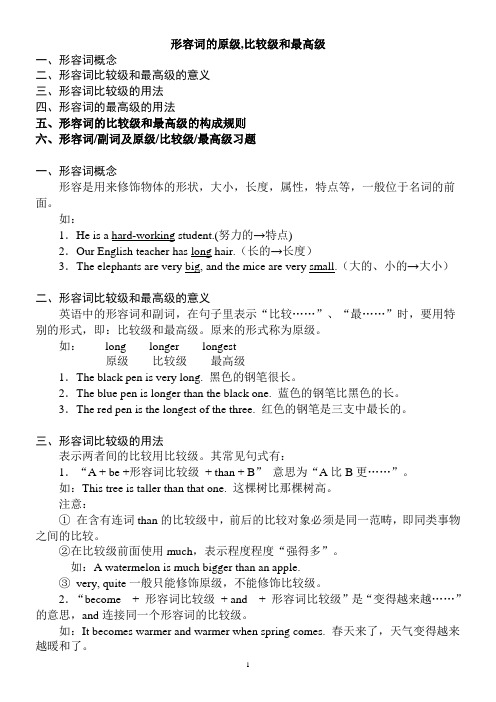
形容词的原级,比较级和最高级一、形容词概念二、形容词比较级和最高级的意义三、形容词比较级的用法四、形容词的最高级的用法五、形容词的比较级和最高级的构成规则六、形容词/副词及原级/比较级/最高级习题一、形容词概念形容是用来修饰物体的形状,大小,长度,属性,特点等,一般位于名词的前面。
如:1.He is a hard-working student.(努力的→特点)2.Our English teacher has long hair.(长的→长度)3.The elephants are very big, and the mice are very small.(大的、小的→大小)二、形容词比较级和最高级的意义英语中的形容词和副词,在句子里表示“比较……”、“最……”时,要用特别的形式,即:比较级和最高级。
原来的形式称为原级。
如:long longer longest原级比较级最高级1.The black pen is very long. 黑色的钢笔很长。
2.The blue pen is longer than the black one. 蓝色的钢笔比黑色的长。
3.The red pen is the longest of the three. 红色的钢笔是三支中最长的。
三、形容词比较级的用法表示两者间的比较用比较级。
其常见句式有:1.“A + be +形容词比较级+ than + B”意思为“A比B更……”。
如:This tree is taller than that one. 这棵树比那棵树高。
注意:①在含有连词than的比较级中,前后的比较对象必须是同一范畴,即同类事物之间的比较。
②在比较级前面使用much,表示程度程度“强得多”。
如:A watermelon is much bigger than an apple.③very, quite一般只能修饰原级,不能修饰比较级。
2.“become + 形容词比较级+ and + 形容词比较级”是“变得越来越……”的意思,and连接同一个形容词的比较级。
英语语法练习题六年级

英语语法练习题六年级一、选择正确的词填空。
1. I ________ playing basketball with my friends yesterday.A. amB. wasC. is2. The cat ________ on the chair when I saw it.A. is sittingB. sitC. was sitting3. ________ you see a rainbow after the rain?A. CouldB. DoesC. Did4. Mary ________ to the supermarket to buy some fruits yesterday.A. goB. goesC. went5. ________ you finish your homework yet?A. HaveB. DidC. Does二、根据句意选择合适的单词填空。
1. We ________ swimming in the lake last summer.A. goB. wentC. goes2. It's too hot. Can you ________ the window?A. openB. openedC. opens3. The boy ________ a book in the library yesterday.A. readB. readsC. reading4. Tom ________ his leg while he was playing football.A. breakB. breaksC. broke5. She ________ some eggs for breakfast this morning.A. friesB. fryC. fried三、用所给词的适当形式填空。
1. The girls ________ (dance) happily at the party yesterday.2. My sister ________ (not go) to school because she was sick.3. They ________ (eat) ice cream when it started to rain.4. He ________ (work) in a hospital last year.5. ________ the dog ________ (bite) you when you were walking in the park?四、按要求改写句子。
六年级英语语法综合练习题及答案
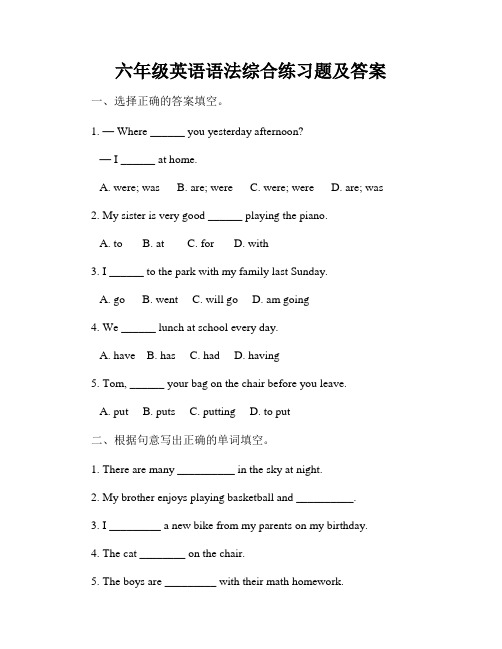
六年级英语语法综合练习题及答案一、选择正确的答案填空。
1. — Where ______ you yesterday afternoon?— I ______ at home.A. were; wasB. are; wereC. were; wereD. are; was2. My sister is very good ______ playing the piano.A. toB. atC. forD. with3. I ______ to the park with my family last Sunday.A. goB. wentC. will goD. am going4. We ______ lunch at school every day.A. haveB. hasC. hadD. having5. Tom, ______ your bag on the chair before you leave.A. putB. putsC. puttingD. to put二、根据句意写出正确的单词填空。
1. There are many __________ in the sky at night.2. My brother enjoys playing basketball and __________.3. I _________ a new bike from my parents on my birthday.4. The cat ________ on the chair.5. The boys are _________ with their math homework.三、选择合适的词填空。
1. _______ a pencil and a book on the desk.A. There isB. There areC. Is thereD. Are there2. Lisa is watching TV. ________ are reading books.A. SheB. HeC. ID. They3. The students ________ in the classroom now.A. amB. isC. areD. Be4. I am _______my mother do the housework now.A. seeingB. watchingC. helpingD. looking5. My father _______ a new car next month.A. buysB. buyC. buyingD. will buy四、根据情景填空。
六年级英语语法总复习(课堂用练习题答案)2
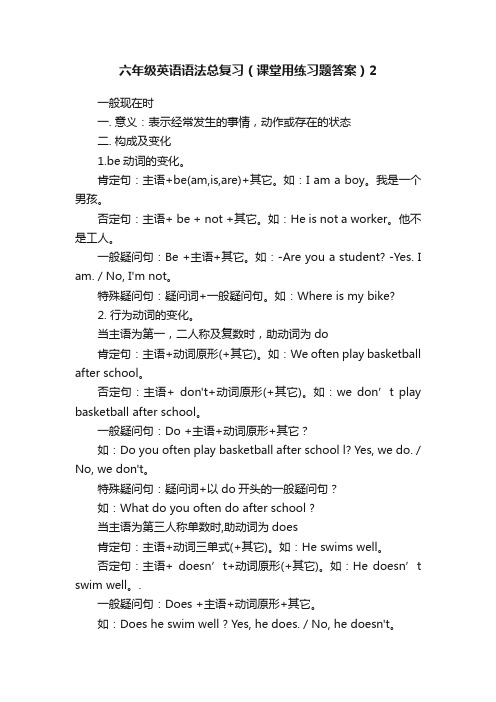
六年级英语语法总复习(课堂用练习题答案)2一般现在时一. 意义:表示经常发生的事情,动作或存在的状态二. 构成及变化1.be动词的变化。
肯定句:主语+be(am,is,are)+其它。
如:I am a boy。
我是一个男孩。
否定句:主语+ be + not +其它。
如:He is not a worker。
他不是工人。
一般疑问句:Be +主语+其它。
如:-Are you a student? -Yes. I am. / No, I'm not。
特殊疑问句:疑问词+一般疑问句。
如:Where is my bike?2. 行为动词的变化。
当主语为第一,二人称及复数时,助动词为do肯定句:主语+动词原形(+其它)。
如:We often play basketball after school。
否定句:主语+ don't+动词原形(+其它)。
如:we don’t play basketball after school。
一般疑问句:Do +主语+动词原形+其它?如:Do you often play basketball after school l? Yes, we do. / No, we don't。
特殊疑问句:疑问词+以do开头的一般疑问句?如:What do you often do after school ?当主语为第三人称单数时,助动词为does肯定句:主语+动词三单式(+其它)。
如:He swims well。
否定句:主语+ doesn’t+动词原形(+其它)。
如:He doesn’t swim well。
.一般疑问句:Does +主语+动词原形+其它。
如:Does he swim well ? Yes, he does. / No, he doesn't。
特殊疑问句:疑问词+以does开头的一般疑问句?如:How does your father go to work?三。
小学英语语法总复习(带练习题)

当主语为第三人称(dì sān rén chēnɡ)单数(he, she, it)
时,要在动词后加“-s”或“-es” 如:Mary likes Chinese.玛丽喜欢汉语。
第六页,共四十八页。
一般现在时的变化(biànhuà)
❖2. I do my homework every day.(改为一般疑问 句,作否定回答)
______________________________________
❖3. She likes milk.(改为一般疑问句,作肯定回答)
____________________________________
2、现在进行时的肯定句基本结构为be 加动词ing.
3、现在进行时的否定句在be后加not。
4、现在进行时的一般疑问句把be动词调到句首。
5、现在进行时的特殊疑问(yíwèn)的基本结构为: 疑问词+be动词+主语+doing+其它? 但疑问词当主语时其结构为: 疑问词+be动词+doing+其它?
2. Listen!Some girls _____( sing) in the classroom . 3. My mother ________( cook )some nice
food now.
4. What _____ you ______ ( do ) now?
5. Look!They __________( have) an English lesson .
7. The girl _______(teach) us English on
小学英语语法练习题及答案

小学英语语法练习题及答案小学英语语法练习题及答案【篇一:小学英语语法及练习题--名词】定义名词可以分为专有名词和普通名词,专有名词是某个(些)人,地方,机构等专有的名称,如beijing,china等。
普通名词是一类人或东西或是一个抽象概念的名词,如:book,sadness等。
普通名词又可分为下面四类:1)个体名词:表示某类人或东西中的个体,如:gun。
2)集体名词:表示若干个个体组成的集合体,如:family。
4)抽象名词:表示动作、状态、品质、感情等抽象概念,如:work。
个体名词和集体名词可以用数目来计算,称为可数名词,物质名词和抽象名词一般无法用数目计算,称为不可数名词。
2. 名词复数的规则变化(情况,构成方法,读音,例词)a. 一般情况在名词后加-s清辅音后读/s/map-maps浊辅音和元音后读 /z/bag-bags /car-carsb. 以s, sh, ch, x等结尾的名词加-es读 /iz/bus-buses/ watch-watches/brush-brushes/box-boxesc. 以ce, se, ze,等结尾加 -s读 /iz/license-licensesd. 以辅音字母+y结尾的名词把变y 为i再加es读 /z/baby---babiese. 以o 结尾的名词,变复数时:1). 加s,如: photo---photos piano---pianosradio---radioszoo---zoos;2). 加es,如:potato--potatoes tomato--tomatoes3). 上述a和b两种方法均可,如zero---zeros / zeroes。
f. 以f或fe 结尾的名词变复数时:1). 加s,如: belief---beliefsroof---roofssafe---safes gulf---gulfs2). 去f, fe 加ves,如:half---halvesknife---knives leaf---leaves wolf---wolveswife---wives life---lives thief---thieves3). 上述a和b两种方法均可,如handkerchief: handkerchiefs / handkerchieves。
六年级英语语法总复习课堂用练习题答案
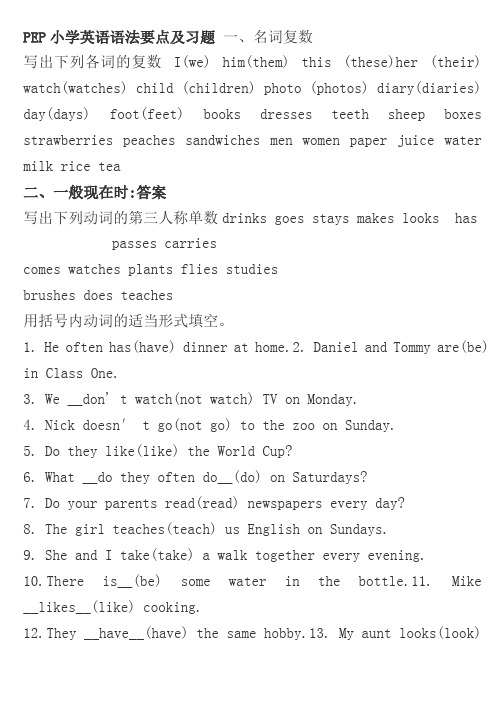
PEP小学英语语法要点及习题一、名词复数写出下列各词的复数I(we) him(them) this (these)her (their) watch(watches) child (children) photo (photos) diary(diaries) day(days) foot(feet) books dresses teeth sheep boxes strawberries peaches sandwiches men women paper juice water milk rice tea二、一般现在时:答案写出下列动词的第三人称单数drinks goes stays makes looks has passes carriescomes watches plants flies studiesbrushes does teaches用括号内动词的适当形式填空。
1. He often has(have) dinner at home.2. Daniel and Tommy are(be) in Class One.3.We __don' t watch(not watch) TV on Monday.4.Nick doesn′ t go(not go) to the zoo on Sunday.5.Do they like(like) the World Cup?6.What __do they often do__(do) on Saturdays?7.Do your parents read(read) newspapers every day?8.The girl teaches(teach) us English on Sundays.9.She and I take(take) a walk together every evening.10.T here is__(be) some water in the bottle.11. Mike __likes__(like) cooking.12.T hey __have__(have) the same hobby.13. My aunt looks(look)after her baby carefully.14.Y ou always __do(do) your homework well.15. I am__(be) ill. I'm staying in bed.16.S he goes(go) to school from Monday to Friday.17. Liu Tao __does_(do) not like PE.18.T he child often watches(watch) TV in the evening.19.S u Hai and Su Yang __have__(have) eight lessons this term.20.—What day is__(be) it today?— It's Saturday.按照要求改写句子1.Daniel doesn' t watch TV every evening.2.Do you do your homework every day? Yes, I do.3.Does she like milk? Yes, she does.4.Does Amy like playing computer games? No, she doesn' t.5.We don' t go to school every morning.6.He doesn' t speak English very well.7.What do you like in the park.8.John comes from Canada.(对划线部分提问)9.She is always a good student. 改为一般疑问句,作否定回答)10.S imon and Daniel like going skating.(改为否定句) 改错(划出错误的地方,将正确的写在横线上)English?_________________ 2.Does he likes going fishing?_________________ 3.He likes play games after class._________________ 4.Mr. Wu teachs us English._________________ 5. She don't do her homework on Sundays.二、现在进行时:写出下列动词的现在分词:play ___ run _____ s wim _____ m akego like write ski read __ have_ sing __ dance_ __ put __ __ see __ __ buy ___ ___ lovelive take come get stop sitbegin shop用所给的动词的正确形式填空:1 .The boy( draw)a picture now.2 . Listen . Some girls( sing)in the classroom .3 . My mother( cook )some nice food now.4 . What you( do ) now?5 . Look . They( have) an English lesson .6 .They(not , water) the flowers now.1. Is your brother speak7.Look! the girls(dance )in the classroom .8.What is our granddaughter doing? She (listen ) tomusic.9. It's 5 o'clock now. We (have)supper now10.Helen(wash )clothes? Yes ,she is .句型转换:1.They are doing housework .(分别改成一般疑问句和否定句)2.The students are cleaning the classroom .(改一般疑问句并作肯定和否定回答)3.I’m playing the football in the playground .(对划线部分进行提问)4. Tom is reading books in his study .(对划线部分进行提问)四、一般将来时:填空。
- 1、下载文档前请自行甄别文档内容的完整性,平台不提供额外的编辑、内容补充、找答案等附加服务。
- 2、"仅部分预览"的文档,不可在线预览部分如存在完整性等问题,可反馈申请退款(可完整预览的文档不适用该条件!)。
- 3、如文档侵犯您的权益,请联系客服反馈,我们会尽快为您处理(人工客服工作时间:9:00-18:30)。
一般现在时一. 意义:表示经常发生的事情,动作或存在的状态二. 构成及变化1.be动词的变化。
肯定句:主语+be(am,is,are)+其它。
如:I am a boy。
我是一个男孩。
否定句:主语+ be + not +其它。
如:He is not a worker。
他不是工人。
一般疑问句:Be +主语+其它。
如:-Are you a student? -Yes. I am. / No, I'm not。
特殊疑问句:疑问词+一般疑问句。
如:Where is my bike?2. 行为动词的变化。
当主语为第一,二人称及复数时,助动词为do肯定句:主语+动词原形(+其它)。
如:We often play basketball after school。
否定句:主语+ don't+动词原形(+其它)。
如:we don’t play basketball after school。
一般疑问句:Do +主语+动词原形+其它?如:Do you often play basketball after school l? Yes, we do. / No, we don't。
特殊疑问句:疑问词+以do开头的一般疑问句?如:What do you often do after school ?当主语为第三人称单数时,助动词为does肯定句:主语+动词三单式(+其它)。
如:He swims well。
否定句:主语+ doesn’t+动词原形(+其它)。
如:He doesn’t swim well。
.一般疑问句:Does +主语+动词原形+其它。
如:Does he swim well ? Yes, he does. / No, he doesn't。
特殊疑问句:疑问词+以does开头的一般疑问句?如:How does your father go to work?三。
第三人称单数的动词变化规则(只有在第三人称为主语的肯定句中,动词才用三单式)(1)多数动词直接加s:runs gets likes collets takes plays climbs……。
(2)结尾是s, x, sh, ch, o,前为辅音字母,结尾加es :watches teaches goes does washes crosses mixes brushes(3)动词末尾y前为辅音:将y改为i加es: study→studies fly→flies carry→carries cry→cries但在y前如果为元音则直接加s:buys says四。
时间标志:always , usually , often , sometimes ,every…一。
意义——当表示现在正在进行的动作或正在发生的事。
二。
构成:be (am, is ,are )+动词现在分词-ing形式肯定句:主语+ be + 现在分词V-ing (+ 其他) I’m doing my homework now 。
否定句:主语+be+not+动词-ing +其他. I’m not doing my homework now。
一般疑问句:Be+主语+动词-ing +其他?Are you doing your home work now? Yes, I am . No , I’m not 。
特殊疑问句:特殊疑问词+be+主语+动词-ing+其他?What are you doing now ?三. 现在分词的构成:(1)一般在动词末尾直接加ing,(2)以不发音字母e结尾的动词,先去掉e,再加ing,如skate →skating make →making dance → dancing write → writing have → havingride → riding come → coming(3)以重读闭音节结尾的动词,中间只有一个元音字母,词尾只有一个辅音字母,应双写末尾的辅音字母,再加ing, 如:putting running beginning stopping swimming shopping joggingsitting getting forgetting letting四。
时间标志——now,句前的look ,listen一般过去时一。
意义:表示过去某个时间发生的事情或存在的状态。
二。
构成及变化1. Be动词在一般过去时中的变化:am 和is在一般过去时中变为was。
(was not=wasn’t)are在一般过去时中变为were。
(were not=weren’t)带有was或were的句子,其否定、疑问的变化和is, am, are一样,即否定句在was或were后加not,一般疑问句把was或were调到句首。
2.行为动词在一般过去时中的变化:肯定句:主语+ 动词的过去式.I watched a film last Sunday 。
否定句:主语+ didn’t + 动词原形.I didn’t watch a film last Sunday 。
一般疑问句:Did + 主语+ 动词原形?Did you watch a film last Sunday ? Yes, I did . No , I didn’t 。
特殊疑问句:疑问词+ 以did 开头的一般疑问句?What did you do last Sunday ?三、时间标志:yesterday morning (afternoon, evening…)last night (week, month, year…),a moment ag o , a week ago, three years ago…just now,动词过去式变化规则:1.一般在动词末尾加-ed,如:pull-pulled, cook-cooked2.结尾是e加d,如:taste-tasted3.末尾只有一个元音字母和一个辅音字母的重读闭音节,应双写末尾的辅音字母,再加-ed,如:stop-stopped4.以“辅音字母+y”结尾的,变y为i,再加-ed,如:study-studied一般将来时一。
意义:表示将来某个时间要发生的动作或存在的状态,也表示将来经常或重复发生的动作。
二. 构成及变化:一般将来时常用的两种结构be going to+动词原形: 表示打算、准备做的事或即将发生或肯定要发生的事。
shall/will+动词原形: 表示将要发生的动作或情况,没有太多的计划性,还用来表示意愿1. be going to +动词原形1.肯定句主语+be(am /,is,/ are) going to +动词原形+其它成份My sister is going to learn English next year. 我姐姐准备明年学英语。
2.否定句主语+be(am / is / are)not going to +动词原形+其它成份I am not going to(go to)the cinema tonight. 我今天晚上不打算去看电影。
3.一般疑问句Be (am / is / are)+主语+going to+动词原型+其它成份…?Is your father going to play basketball with you ?No , he isn’t。
你父亲打算和你去打篮球吗?不。
4.特殊疑问句特殊疑问词(Wh-)+一般疑问句?Where are you going to spend Spring Fesital.? 春节你打算在哪过?5.注意:be going to 结构后面习惯上不跟go ,come 等表位移的动词,一般用该动词的进行时形式表示。
如:He’s going to New York next week。
下周他要去纽约。
2.will /shall +动词原形(在书面语中,主语是第一人称时,常用shall ,在口语中,所有人称都可以用will)1.肯定句主语+will/shall+动词原形+其它成份I (shall) write to him next week. 下周我将给他写信。
2.否定句主语+ will /shall+ not + 动词原形+其它成份They won’t watch TV this evening。
今天晚上他们不看电视。
3.一般疑问句will/shall+主语+动词原形+其它成份Will you stay at home with us tomorrow ?明天你和我们呆在家里好吗?4.特殊疑问句特殊疑问词(Wh-) +一般疑问句When will your father be back? 你爸爸什么时侯回来?三、附:Shall I /we …常用来征求对方意见,而问对方是否愿意,或者表示客气的邀请,常用Will you…?他们的回答比较灵活。
1.Shall we go to the park ?肯定Sure , let’s go 。
否定No , let’s go to the ci nema。
2.Will you please come to my birthday party next week ?肯定Yes, I will. / Sure 。
否定I’m sorry. I’m afraid I can’t。
四、时间标志:tomorrow , soon ,next Monday , next year , next weekend , this afternoon , this evening ……小学英语语法要点及习题写出下列各词的复数 I(we) him(them) this (these)her (their) watch(watches) child (children) photo (photos) diary(diaries) day(days) foot(feet) books dresses teeth sheep boxes strawberries peaches sandwiches men women paper juice water milk rice tea写出下列动词的第三人称单数 drinks goes stays makes looks ____ has___ passes____ carries ____ comes_______ watches___ plants____ flies ____studies_______ brushes________ does_____ teaches______用括号内动词的适当形式填空。
1. He often ___has_____(have) dinner at home.2. Daniel and Tommy ___are____(be) in Class One.3. We __don’t watch_____(not watch) TV on Monday.4. Nick ___doesn’t go____(not go) to the zoo on Sunday.5. __Do__ they ___like___(like) the World Cup?6. What __do____they often ___do__(do) on Saturdays?7. ___Do__ your parents ___read___(read) newspapers every day?8. The girl __teaches___(teach) us English on Sundays.9. She and I __take___(take) a walk together every evening.10. There ___is__(be) some water in the bottle.11. Mike __likes__(like) cooking.12. They __have__(have) the same hobby.13. My aunt looks(look) after her baby carefully.14. You always __do___(do) your homework well.15. I __am__(be) ill. I’m staying in bed.16. She __goes__(go) to school from Monday to Friday.17. Liu Tao __does_(do) not like PE.18. The child often __watches___(watch) TV in the evening.19. Su Hai and Su Yang __have__(have) eight lessons this term.20. -What day __is__(be) it today?-It’s Saturday.按照要求改写句子1. Daniel doesn’t watch TV every evening.2. Do you do your homework every day? Yes, I do.3. Does she like milk? Yes, she does.4. Does Amy like playing computer games? No, she doesn’t.5. We don’t go to school every morning.6. He doesn’t speak English very well.7. What do you like in the park.8. John comes from Canada.(对划线部分提问)___________________________________________________9. She is always a good student.(改为一般疑问句,作否定回答)________________________________________________________10. Simon and Daniel like going skating.(改为否定句)___________________________________________________改错(划出错误的地方,将正确的写在横线上)1. Is your brother speak English? __________________2. Does he likes going fishing? __________________3. He likes play games after class. __________________4. Mr. Wu teachs us English. __________________5. She don’t do her homework on Sundays. _________________写出下列动词的现在分词:play____ run_____ swim _____ make____ go______ like____ write____ ski_____ read_____ have_____ sing ___ dance____ put______ see_____ buy ______ love_____live______ take____ come ____ get_____ stop_______ sit _____ begin_____ shop________用所给的动词的正确形式填空:1.The boy __________________ ( draw)a picture now.2. Listen .Some girls _______________ ( sing)in the classroom .3. My mother _________________ ( cook )some nice food now.4. What _____ you ______ ( do ) now?5. Look . They _______________( have) an English lesson .6.They ____________(not ,water) the flowers now.7.Look! the girls ________________(dance )in the classroom .8.What is our granddaughter doing? She _________(listen ) to music.9. It’s 5 o’clock now. We _____________(have)supper now10.______Helen____________(wash )clothes? Yes ,she is .句型转换:1. They are doing housework .(分别改成一般疑问句和否定句)____________________________________________________________________________________________________________2.The students are cleaning the classroom . ( 改一般疑问句并作肯定和否定回答)__________________________________________________________________________________________________________________3.I’m playing the football in the playground .(对划线部分进行提问)________________________________________________________4.Tom is reading books in his study . (对划线部分进行提问)_________________________________________________________填空。
